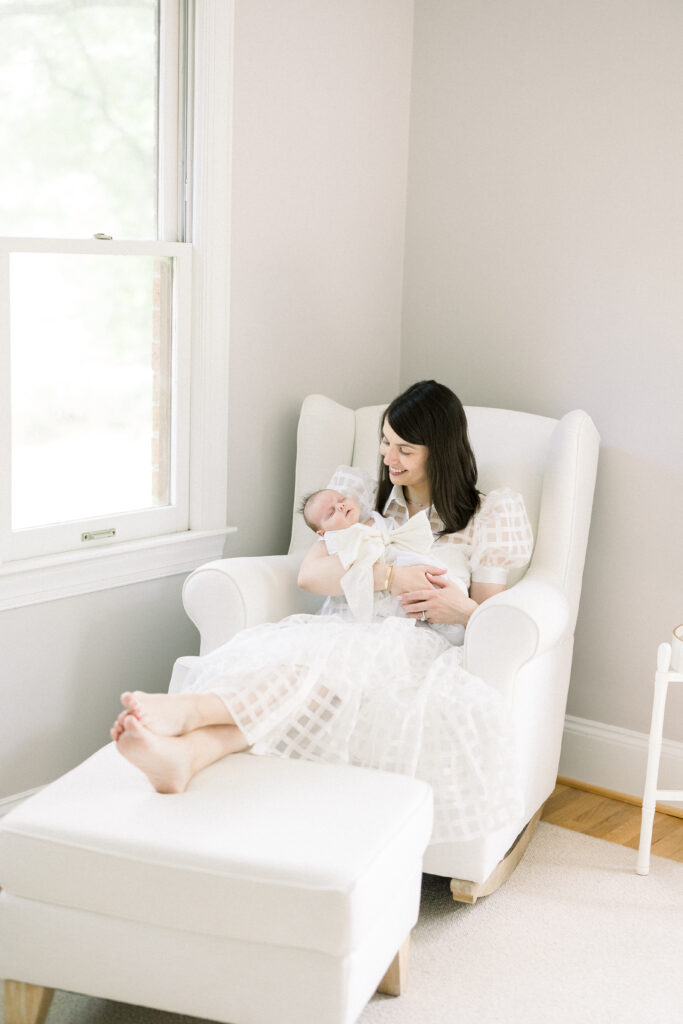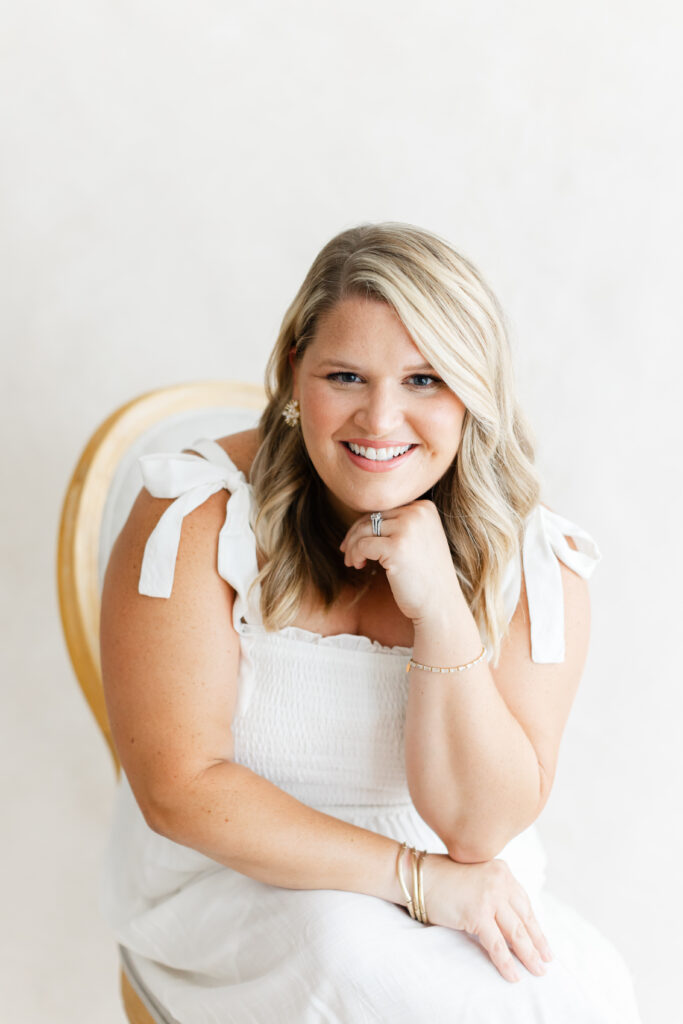We are back this month sharing Part 2 of my Q&A with perinatal mental health therapist, Kathryn Beam!
If you missed Part 1, click here to read and come back to Part 2 when you are done!
Bringing a new baby home is beautiful, but it can also feel overwhelming. As a newborn photographer here in Greensboro, I get a front-row seat to those first tender weeks — the sweet snuggles, the tiny details, and also the exhaustion and self-doubt that can sneak in when life suddenly changes overnight.
Because of that, I care about more than just creating heirloom photographs for my clients. I care about the whole experience of early motherhood — how you feel, how supported you are, and how you’ll remember these days when you look back on your images years from now.
That’s why I’m so honored to partner with Kathryn Beam, a perinatal mental health therapist, for this post. She’s answering common questions about what new moms experience emotionally, how to know when to reach out for help, and simple ways to care for yourself in the midst of it all. My hope is that this Q&A gives you not only beautiful photographs to look back on, but also support and reassurance for the season you’re in right now.

Part 2:
Q: I keep having scary thoughts about dropping the baby, and I just can’t make them go away. They’re really freaking me out. Am I crazy?
A: Intrusive thoughts are more normal than you think. They are unwanted, often disturbing thoughts or images that pop into your mind out of nowhere. For new parents, they can be really alarming – like imagining harm coming to your baby, or even thoughts of doing something you would never actually do. These thoughts are surprisingly common, occurring in over 80% of women, and they often center around health concerns, like exposure to germs or bacteria, or safety concerns, like dropping the baby. Having them doesn’t mean you’re dangerous or crazy. In fact, they’re often a sign of anxiety, not intent. It’s your brain’s desire to protect and love your baby gone a bit haywire.
What matters is how you feel about the thoughts – if they distress you, make you feel ashamed, or you’re avoiding certain situations because of them, it’s time to talk to a therapist. You deserve support, and there are ways to manage these thoughts so they don’t control your day-to-day life.
*Most intrusive thoughts are not a cause for concern. However, if the thoughts are not distressing but instead make sense to you, or you feel compelled to act on these thoughts, please seek immediate assistance – let a trusted friend, partner, or family member know right away, and call 911 immediately.
Q: I feel like I just haven’t responded to everything the way I wanted to, and I’m worried my baby is messed up forever because of me!
A: You were made to be YOUR baby’s mother. Luckily for us all, myself included, we are human, and we act that way! What your baby needs is you – perfect in your imperfection. Perfect in the way you show up every day and try again. Perfect in your ability to see and respond to their needs. There is no pinnacle, and there is no “perfect mother.” The goal posts of motherly success will continue to move, higher and higher and higher. All we can focus on is tending to our relationships the best way we know how, with the tools that we have, and giving love freely to our baby and ourselves. One of the best preventative tools we have in our motherhood toolbox is repairing our relationship with ourselves.
Q: Will I ever feel like myself again?
A: You will. It can be helpful to remind yourself that these symptoms may feel like YOU, who YOU are at your core, but they are not. You will not feel this way forever. And, you don’t have to walk this path alone. These symptoms will, slowly but surely, release their grip on you as you start to share your feelings with others, take care of yourself, and give yourself self-compassion. You are doing better than you think. You have just undergone a MAJOR self transformation. You are meeting your new self for the first time, and learning who you want to be as a mom. You will get there – one step at a time.

Q: So, what do I do?!
A: Let’s start with the basics: eat something nourishing (HIGHLY recommend Aussie bites or another quick source of protein you can keep by your bedside), drink lots of water, get fresh air, touch grass, move your body gently, and try to rest when you can. I don’t mean “sleep while the baby’s sleeping” – sometimes that’s just not possible! But even resting, and reminding yourself that you deserve rest, can be enough to reset your nervous system. Lower the bar on what “productive” looks like. A 3 minute shower is a win! Texting a friend counts. Routine check-ins with yourself – “What do I need right now?” – can help you stay grounded. Speak with your partner about how things are changing, and how they can best support you; this may mean re-negotiating household or baby related responsibilities. A good example is one partner taking care of feeding the baby, while the other partner takes on all diaper changes. Do a quick 5 minute reset – can I listen to a song that brings me joy? Do I maybe have time for one chapter (or a few pages!) of a book that I enjoy? What about watching a clip from my favorite show? Small things done consistently can make a big impact!
Q: Ok, but what about when I’m struggling in the moment? The baby is crying, nothing is clean, I haven’t slept in days, and I’m totally losing it.
A: The first thing I would suggest is to do some grounding techniques to remind your nervous system that you are, in fact, safe in the moment. When we feel overwhelmed and anxious, our bodies and brains don’t know the difference between feeling overstimulated and a bear chasing us! We are literally wired to be hypervigilant when we are protecting a new little life, so although it doesn’t feel very good, it is normal. Grounding techniques may look like taking a few slow, deep breaths, placing your feet flat on the floor, and naming 5 things you see around you. Say out loud, “This is hard, and I’m doing my best.” Give yourself permission to step away safely – even if it’s just to the next room to regroup. You can also text a friend, partner, or caring other just to say, “I need a minute.” Sometimes the goal isn’t to fix everything, but to make some space to breathe.
Q: How does a family photo session support my mental health? I feel like I can barely get myself dressed in the morning, let alone take family pictures right now!
A: It may seem surprising, but a photo session is more than just pretty pictures. It’s a chance to pause, to celebrate your family as you are – messy, beautiful, tired, joyful, REAL. It’s a moment in time captured for exactly what it is. Seeing yourself from the outside, through a compassionate lens, can reflect a kind of strength and love you may not feel every day. That visual reminder can be incredibly healing, especially during tough moments. Finding a photographer who takes the time to really get to know you, who sees the inner AND outer beauty, and is able to capture your life for the magic that it is – is totally priceless.


Q: Ok, I’m interested, and I think I’m ready to talk to someone. How do I find a counselor?
A: I’d recommend looking for someone that specializes in Perinatal Mental Health. Ideally, this individual should have some level of specialized training, and hold a PMH-C, or Perinatal Mental Health Certification, through Postpartum Support International. This certification is widely considered the “gold standard” for specialists in this field. Some good places to start are the Postpartum Support International Provider Directory, and Psychology Today. Both sites let you filter by location (city, state, or region) as well as by payment options like insurance or private pay.
Q: What is the process for connecting with someone? What can I expect logistically from our sessions?
Every therapist has their own approach, so the onboarding process can vary. Generally, you’ll start with a (usually free) 15-20 minute consultation to see if it feels like a good fit. If it does – and your schedules, payment, and interest align – you’ll receive intake paperwork to complete. Once that’s done and benefits are confirmed, you’ll schedule your first session.
That first meeting, called an intake session, is typically around 90 minutes. It gives your therapist a chance to learn more about your background, current concerns, and what you’re hoping to get out of therapy. From there, you’ll start working together to set goals and explore what healing looks like for you. Ongoing sessions are usually about 50 minutes.
Q: Any suggestions for resources that might help?
A: Sometimes it feels best to step away from all things pregnancy and postpartum – and that’s completely okay. Other times, it helps to lean in and learn more about this wild, transformative journey. If you’re looking for thoughtful, validating resources, I recommend:
Books:
The Pregnancy Workbook by Katayune Kaeni
Matrescence by Lucy Jones
Mama Rising by Amy Taylor-Kabbaz
This Isn’t What I Expected: Overcoming Postpartum Depression by Karen Kleiman
Good Moms Have Scary Thoughts by Karen Kleiman
Podcasts (if books feel out of reach right now):
Mom and Mind podcast by Dr. Kat
So Glad You Asked with Dr. Ruta Nonacs
The ReProgram with Ann Odom
Local Resources (Greensboro/Triad):
- Postpartum Resource Center of the Triad – great hub for finding providers, support groups, and more
- Cone Health Baby and Me groups – includes lactation support and weekly guest speakers
- Refuge Healing Studio – prenatal yoga, toddler-friendly yoga, and mothers’ groups
- The Mom League of Greensboro – launching a new chapter this fall with an 8-week Newborn Series for postpartum support (themomleague.org)
- Postpartum Support International – offers a wide range of virtual and in-person support groups, helplines, and resources
You don’t have to do it all – just whatever feels supportive right now.
Q: How can I get in touch with you?
A: No one gives you an instruction manual for a baby. Much of the postpartum period is wading through the unknown, hoping to put the pieces together in a way that makes sense. You don’t have to go through this alone. If you are ready to have support in learning who you are as a mother, digging deep into your own feelings and struggles, and having a listening ear from someone who has been there, you can reach me through my website, kathrynbeamcounseling.com. You can also reach me at 336 737 0677, or at kathryn@kathrynbeamcounseling.com. I can’t wait to connect.
Whether you just found out you’re pregnant, in the early days of postpartum, or further along in your parenting journey, your mental health matters. You are not broken; you are becoming. And there is help available, every step of the way.
Thank you so much to Kathryn for sharing her wisdom and compassion in this first part of our series. Supporting new moms goes far beyond beautiful images, and I’m honored to host these conversations here for you.
If anything in this post resonated with you, please feel free to share it with a friend, leave a comment, or reach out to either of us. We’re here to remind you that you’re not alone.

Hi, I’m Lucy Miller—a Greensboro newborn, maternity, and family photographer specializing in luxury sessions that include a curated client wardrobe and custom artwork. I help families not only create meaningful images, but also turn them into heirlooms for their homes.
✨ I’d love to document this precious season for you. Reach out today to reserve your newborn session. Spaces are limited to ensure every family gets the time and attention they deserve.
📩 Get in touch here to book your newborn session.
Leave a Comment
Leave a Reply
As a mom to four little ones, I know firsthand how full this season of motherhood can feel — the mental load, the exhaustion, and the pressure to hold everything together. I remember being newly postpartum and how hard it felt just to get dressed for newborn photos, let alone coordinate outfits and feel present in the moment.
With a thoughtfully guided approach, I’ve created a photography experience that allows mothers to slow down and simply be — present, connected, and supported. Whether we’re photographing in your home or outdoors, my focus is always on natural connection and the quiet moments that reflect this season honestly, and are meant to be enjoyed long after.
Comments